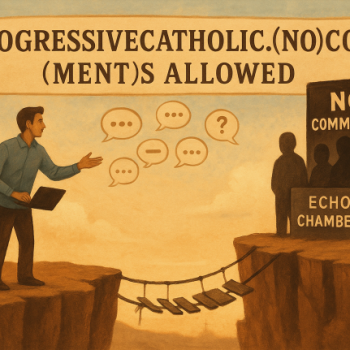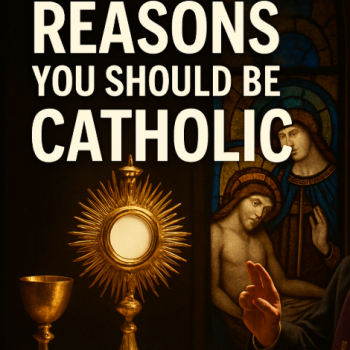I truly enjoy writing on Patheos. I also enjoy reading other Christian bloggers on Patheos, too. Whether other Catholic bloggers or Progressive Christians, Patheos provides a seemingly endless source of enjoyable reading. Moreover, even if I disagree with other writers on multiple topics, I do appreciate the investment of time and effort required to consistently write a blog. In my reading of other blogs, I do have questions, especially for those who consider themselves “progressive” Christians. I Include in this category Catholic progressives.
In this article, I lay out the questions that often come across my mind when reading progressives on Patheos, both Protestant and Catholic. I do not wish to “lord” over other Christians or assume an air of superiority. I honestly want to know how and why others come to different conclusions than I do. Greater understanding comes through open and honest dialogue.
So, progressives, let’s talk.
What Does the Christian Life Look Like?
As someone who considers himself a faithful Catholic, I see the call of the Church as a call from Christ to the fullness of the Christian life and holiness. Catholic means universal, so the call to holiness is also universal. According to the Catechism of the Catholic Church:
2013 “All Christians in any state or walk of life are called to the fullness of Christian life and to the perfection of charity.” All are called to holiness: “Be perfect, as your heavenly Father is perfect.”
In order to reach this perfection, the faithful should use the strength dealt out to them by Christ’s gift, so that . . . doing the will of the Father in everything, they may wholeheartedly devote themselves to the glory of God and to the service of their neighbor. Thus, the holiness of the People of God will grow in fruitful abundance, as is clearly shown in the history of the Church through the lives of so many saints.
2014 Spiritual progress tends toward ever more intimate union with Christ. This union is called “mystical” because it participates in the mystery of Christ through the sacraments—”the holy mysteries”—and, in him, in the mystery of the Holy Trinity. God calls us all to this intimate union with him, even if the special graces or extraordinary signs of this mystical life are granted only to some for the sake of manifesting the gratuitous gift given to all.
From my reading of progressive blogs, the call to holiness seems to engender an accusation of judgementalism and superiority. If such is not the case, please correct my error. All sin and fall short (Romans 3:23).
What does the Christian life look like to you?
Who/What Holds the Ultimate Authority in Your Life?
Moreover, as someone who converted to Catholicism (from an anti-Catholic position), my change of mind took months. I explored all facets of Catholic theology and practice—orthodoxy and orthopraxy. At my confirmation service, the priest (standing in for the bishop) asked me if I accepted all the Church taught as true. My understanding of this moment, then and now, was that I placed my personal spiritual autonomy under Church authority. Now, this does not mean blind obedience to the personal interpretation of bishops or priest. It means that I submit my personal theological opinions to the Church. I give the Church deference in matters of faith and morals.
So, who/what holds the ultimate authority in your life?
Why the Lack of Charity Towards Those Who Disagree with You?
Furthermore, the most troubling aspect of some progressive bloggers (not all) is the lack of charity and willingness to dialogue towards those who disagree with them. Their blogs come across more as monologues than dialogues. For example, calling conservative bishops “wh*res” and conservative Catholics “racist fascists” is not only false, but very uncharitable. Don’t get me wrong. I am all for free speech. But the vitriol leveled at conservative Catholics is appalling. Below are some recent examples I have personally been subject to. While I am not called out by name, my writings are referenced. Since this blogger does not allow me to make a defense on her blog, I respond to her accusations below her comments. Her full article is here.
Examples of a Lack of Charity
Example 1
Folks, if the tactics involve bucking medicine/science, gaslighting, abusing people, coercing votes, oppressing others, harming the vulnerable, marginalizing people, endangering lives, and even killing to achieve the goal of “getting them into heaven,” then it is not of God or of His love for humanity. It also goes against core doctrines of Catholic Social Teaching and the Catechism of the Catholic Church (paragraph #2358) which are rooted in Tradition, Scripture (2000+ Bible verses) History, and Moral Doctrine, especially in the areas of the Sanctity of Life and the Dignity of the Human Person which are non-negotiable Catholic Teachings.
The blogger’s reference “getting them into heaven” seems to call out my article, Bishops: Please Help Us Get Into Heaven. In that article, I share an open letter from Regis Martin at Crisis Magazine to all Catholic bishops. In this letter, Martin pleads for the bishops to fulfil their primary duty as caretakers of souls God placed under their authority. Every word in my article and every word in Martin’s letter reflect official Church teaching. Absent from my article (all my articles) and the letter is any attempt at denial, gaslighting, abuse, coercion, oppression, harm, marginalization, endangerment, and the threat of death. To even suggest the latter is an attempt to damage the character of those with whom the blogger disagrees. As an aside, the blogger needs to read paragraph 2359 in the Catechism.
Example 2
I need to say why I agreed with Patheos to remove the ability for others to comment at the end of my posts. A few from the Catholic Right became so aggressive on most posts that I just didn’t have the strength to keep my faith, stay in the Catholic Church, and fight them off. So when Patheos reached out and offered to turn off commenting for my column, I agreed to make this change for my own spiritual health and the spiritual health of my family.
If one were to read my comments to this blogger, it would become clear that I did not do so in an “aggressive” manner. I try to always engage others with the utmost respect when I comment on their blogs or my own. Moreover, pointing out where we disagree, and challenging assumptions, is not aggression. How else do we come to greater understanding if not through dialogue?
Example 3
One from the Catholic Right in particular “exercised his right to express his opinion” to the point of arguing on nearly every post and then introduced families like mine to the Episcopal Church while he and his own “rightfully stay Catholic” since our “less than” families are not “good enough.” This trad acted with more authority than the Pope who welcomes our families of atypical kids with love.
My blog is The Latin Right… But I digress. The article in question is Allow Me to Introduce You to the Episcopal Church. My reasons for writing it appear in the opening paragraph. It states:
I jest in the title of this article. All people, regardless of background, I desire join the Catholic Church. I do not wish any to leave Christ’s Church. My jest highlights my concern for dissenting or heterodox Catholics who I believe are more theologically in the line with the Episcopal church than the Catholic Church.
And in my conclusion:
Sadly, many heterodox Catholics remain ill-formed. They prize their personal beliefs over those of the Church. Therefore, I believe they might find a more suitable home within the Episcopal church.
Furthermore, nowhere in my article are the words “rightfully stay Catholic,” “less than” families, and not “good enough.” Therefore, I am bewildered as to why she put these words in quotation marks. In multiple articles, this blogger clearly states that the Church teaching on human sexuality do not universally apply to all Catholics. In fact, she contends that universal application is tantamount to harm and even death. Given this point of view, suggesting a church that agrees with this blogger seems a better choice, in my opinion.
Why the lack of charity towards those who disagree with you?
Progressive Christians, Let’s Talk
To conclude, I again request a continued dialogue with progressives.
To recap my questions:
What does the Christian life look like?
Who holds the ultimate authority in your life?
Why the lack of charity towards those who disagree with you?
As always, my comment section is open for all respectful dialogue. Let’s come and reason together.
Read my other writing here.
Please click the link below to join.
Voices of the Faithful in the Synod on Synodality
Please make your voice heard.
I Support Church Teaching in the Synod of Synodality

















